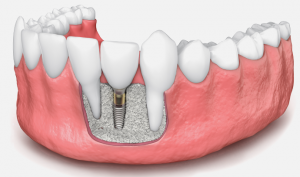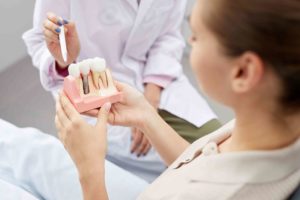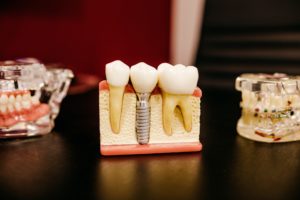Dental implants are like replacements for tooth roots. They are used as foundations for removable or fixed options of replacement teeth that match the natural ones. Implants are considered as cornerstones for the cosmetic dentistry industry.
Before the advent of implants, the only options for missing teeth replacement involved crowns and bridges. These involved unnecessary cutting down of healthy teeth rendering them at an increased risk of developing disease and decay. Implants forego the risk entirely.
In 1952, a Swedish orthopedic surgeon Per-Ingvar Brånemark invented the first dental implant. Dental implants are fixtures that mimic teeth roots and are placed surgically into the jawbone.

Why Are Dental Implants Needed?
Although there have been massive improvements in dental care, millions of Americans still struggle with tooth loss. The most common causes are gum disease, injury, etc. The purpose of replacing teeth in dentistry is to restore their function along with aesthetics.
There are three options of tooth replacement –
- Removable dental appliances (partial or full dentures)
- Fixed dental bridges
- Dental Implants
While dentures are the more affordable picks, they are the least desirable because removal is inconvenient. Moreover, they affect the patient’s sensory and taste experience with food. Dental bridges were more common in terms of restorative options before implants came into play. The main disadvantage is the dependency on natural teeth for support. Additionally, the shaving down of healthy teeth to support bridges puts them at an increased risk of caries.
Dental implants are supported by the jaw bone only and do not affect any of the healthy teeth in the mouth. This makes them the treatment of choice for replacing missing teeth. However, choosing which option works for a patient depends on several factors, namely –
- Location of missing tooth or teeth
- Quality and quantity of jawbone in the area of the missing tooth
- Patient health
- Cost of treatment
- Patient preference
Dental Implants – Advantages
Implants have many advantages over the traditional modes of teeth replacement. These are as follows –
- Implants have a very high success rate – 98%. This is considerably higher than any of the other treatment options.
- Because they are placed into the jaw bone, they fuse with the bone through the process of Osseo-integration. This fusion turns them into one unit, and hence, there is a high level of comfort.
- Implants feel and look like natural teeth, providing the patient with restored aesthetics and self-esteem.
- Implants don’t depend on natural teeth for support, thereby increasing long-term oral health.
- Dentures affect speech, especially if they’re ill-fitting. Additionally, they can also cause problems with eating and are also embarrassing to care for and handle. Implants don’t have any of these inconveniences, making them the treatment of choice.
Procedure To Get Dental Implants
If you are a healthy individual who can undergo extraction or any other oral surgical procedure, you are a candidate for an implant. A patient who is considering getting a dental implant should have healthy gums and bone. Moreover, they must have good oral hygiene and must practice good oral habits, including regular visits to their dentist.
Smokers, people with poor oral hygiene, people suffering from diseases like diabetes, heart disease, etc., or patients undergoing radiation therapy aren’t usually the ideal candidates for implants. They are assessed by their dentists before being advised.
- Before kick-starting the implant procedure, your dentist will perform an extensive examination of the oral cavity. 3D images and X-rays will be taken to assess the quality of the jawbone. Any decayed or damaged teeth might be removed before the implant placement process. A custom treatment plan is dotted out after the dentist determines it safe to proceed.
- A local anesthetic or sedative will be administered to keep you calm and comfortable. To place the titanium implant, your oral surgeon will cut your gum to expose the bone. After drilling space in the jawbone, the implant post will be placed deep within it. You might experience a little soreness and swelling post-surgery, but these are easily managed by over-the-counter medicines.
- With time, the jawbone grows around the implant and fuses with it through the process of Osseo-integration. This builds a strong, long-lasting foundation and the process takes 6 weeks to 6 months. Regular checkups are done to ensure the surgical site is healing properly.
- When the integration is complete, a small connector known as “abutment” is placed above the gum line.
- When the gums are healed, impressions of your upper and lower jaws are taken. These are then sent to a dental lab to prepare the crown for the implant. You can opt for either a fixed crown or a removable one, based on your requirements and your dentist’s recommendation.
- The color will be matched and the crown will be prepared. In your final visit, the crown will be placed. And since it functions as a single unit, it feels like your natural teeth.
- You will be advised to visit your dentist regularly to keep an eye on the progress of the implant.
Does River’s Bend Family Dental Offer Dental Implants?
If you’re around St Francis Boulevard and looking for a dentist to assess whether you are a candidate for dental implants, come on down to River’s Bend Family Dental. We offer a range of services including, but not limited to dental implants. Consider us a center of oral surgery and dental implants.
From the start to the finish, we’ve got you covered. If the initial assessment determines that a tooth or two might have to be removed, we perform seamless tooth extractions. Alternatively, if there is an issue with the quality or quantity of the jaw bone, our team also performs bone grafting. It is an FDA-approved procedure and safe.
The surgical team at River’s Bend also performs full mouth reconstructions, so you know we’ve got the skills to match. As expected, all of our treatments and procedures are tailor-made to each patient. So if you’ve got any further questions or would just like to pop in for a visit, give us a call – 763-576-1855.



